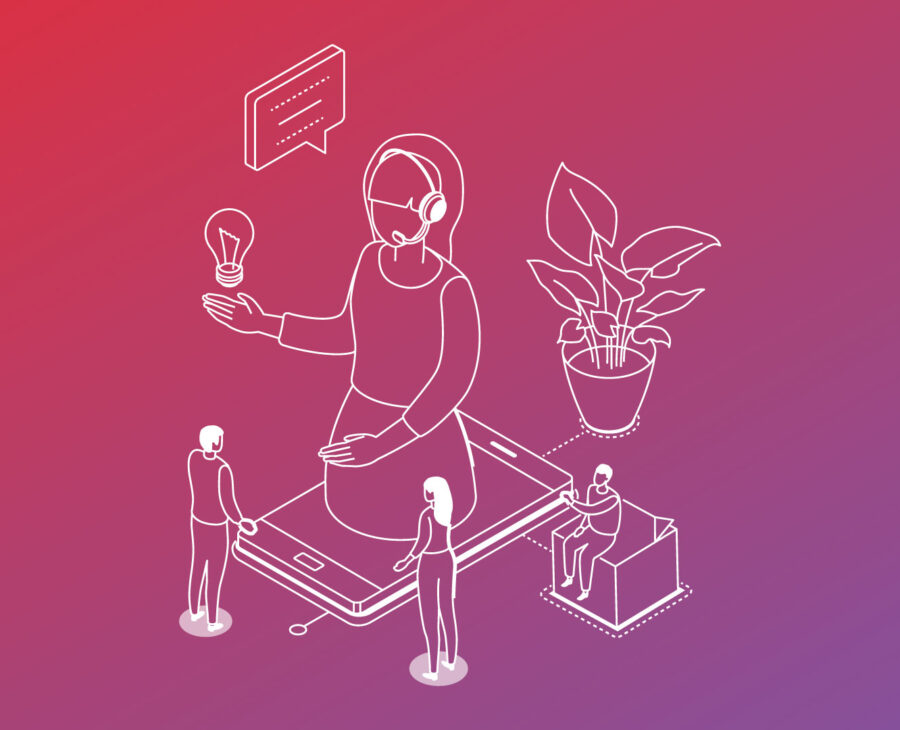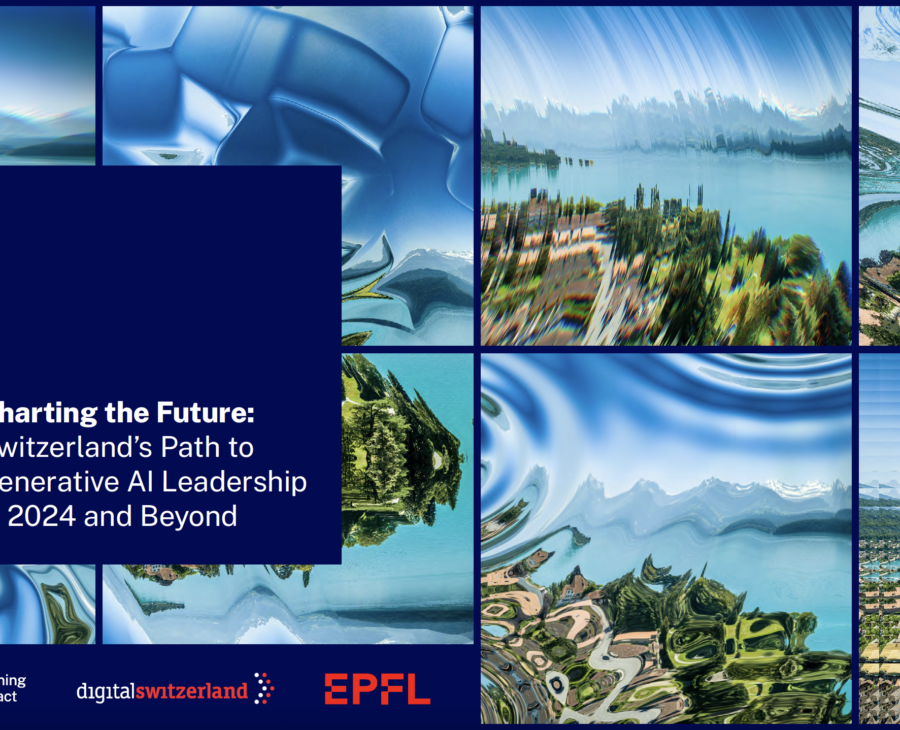Covid-19 triggers a push in digitalisation and thereby establishes a long-term hybrid future in which digital and analogue are seamlessly connected. digitalswitzerland, in cooperation with the Wissensfabrik, developed a white paper outlining five ways of how digital transformation can be continued. It focuses on the potential of digital infrastructure, idea spaces, institutions of the knowledge society, new interfaces and new forms of cooperation.
There are many different aspects of the Covid-19 crisis. The virus attacks our bodies, isolates the sick and the elderly, puts a burden on our healthcare system, triggers infodemics and seals up our echo chambers. We are all affected by an ill-defined fear of invisible danger.
If anyone gets too close to us at a railway station, we flinch. We hesitate before touching door handles, or when our shopping cost exceeds 80 CHF and we have to enter our PIN number using dirty buttons. As a result of social distancing, we have developed an unexpectedly intense relationship with ourselves, our living rooms and our nearest and dearest.
Not everything we learn from that experience is positive. From an economic point of view, a continued lack of customers is causing cash flow problems. We face the threat of a deep recession, which can only be overcome by creating new markets and jobs and which could see a withering of our cultural landscape. Ultimately, Covid-19 is a stress test for digital Switzerland. We are finding out where everyday life slips seamlessly into the digital world and where there is an abrupt divide.
The pandemic experience is exposing digital deficits. Without an online presence, revenues fail to materialise and poor digital solutions lead to a loss of image. This is why those companies and public authorities who have been involuntarily exposed are in a hurry to rectify their deficiencies. Not only could the pandemic experience soon be repeated, but the post-Corona world is also likely to see a more digitally conscious approach by customers, citizens and employees.
You don’t have to be a trend researcher to recognise that Covid-19 will trigger a boost in digitalisation and finally lead us into a hybrid future. In that future, we will consume, work, learn, love, and communicate in a way that is both analogue and digital. The transition between those worlds will only become seamless when all documents, identity papers, signatures, decision-making processes, customer and patient records have been digitalised. Security and data sovereignty need to be ensured at all times. If not, there will be a surge of resistance and a flourishing of cybercrime.
The stress test highlights where digital front runners will accelerate in future – digital shapers, disruptors from San Francisco and Beijing, FinTech companies and web designers. E-sport, e-shopping, Zoom meetings, home office, home-schooling and online university all give us a glimpse of how the transformation may evolve over the next few years. In some cases, it started some time ago. A simple mental exercise generated by Covid-19 serves as a key question as we look to the long-term future.
What will the future demand of us in which we no longer want to touch anything, where we can no longer physically meet other people, and where the internet is the only way out of our homes into the big wide world? Many of the technical and ethical limits of this scenario remain unclear. As radical as these changes could be, they also open up our eyes to new markets and social innovations that would previously have been deemed impossible. Is it not important for Switzerland to anticipate, discuss and process these opportunities and risks?
In order for this to be successful, we have to work together to write the progression of the digital transformation. In the last three months, we made things possible collectively that we needed several years to achieve in the past. However, our way into the digital future will continue. digitalswitzerland and Wissensfabrik show how we can continue to tell our digital story.
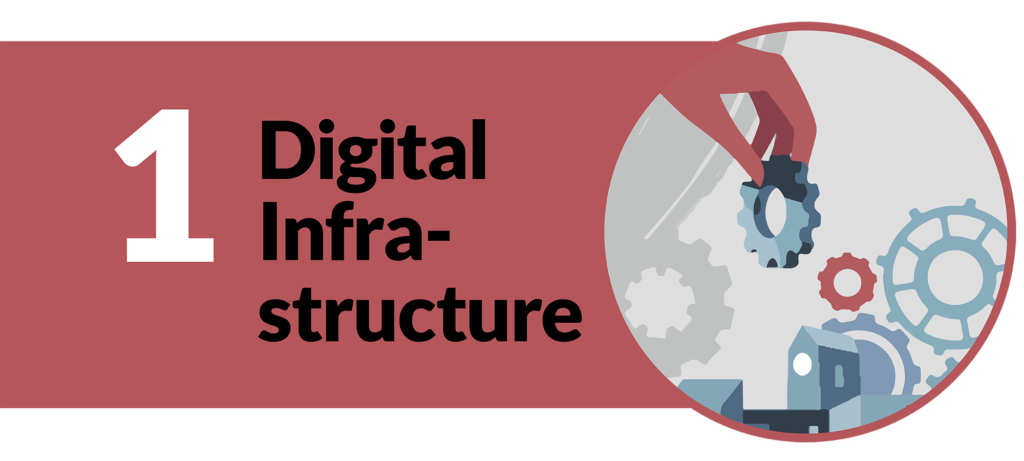
The excellence of a digital society is measured by the quality of its digital infrastructure. Upgrading this is clearly the first way of progressing the digital transformation. Over the last few months, it has been made abundantly clear just how dependent work, consumption, culture, science, communication, and democratic debate have become on cables, hardware, software, and platforms. People and companies are paying the price for not investing into a digital landscape. The pandemic experience is a wake-up call to improve this infrastructure.
Covid-19 has shown where slow internet speeds make our lives more difficult, how well our home office works, how synchronised our devices are, and how difficult it is to introduce an app for public welfare. Investing in our infrastructure means optimising the data exchange between people, companies, public authorities, and machines. It still demands tangible elements: new fibre optic cables in cities, fast hotspots in rural areas, secure data centres, and laptops for employees.
The virus shows us the importance of websites, online shops, social media profiles, customer relationship management, or simply digital contact opportunities. Without online access to archives, documents, databases and agendas, organisations simply stop functioning. Museums, mountain railways, gyms, and open-air swimming pools are now all introducing digital booking systems to ensure social distancing. They recognise how these systems provide knowledge about their businesses and flatten out visitor peaks. Instead of big data and AI, the next few months will require some digital foundation work.
We have identified the gaps in our ability to enable parliaments, law courts, universities, hospitals, public authorities and our employers to function on a digital-only basis for months on end, if need be. These findings are important, because sooner or later, there will be a new pandemic, and in recent weeks, new users have discovered the benefits of the internet. An excellent digital infrastructure protects us from viruses, a volatile economy and infodemics. It is part of our social immune system.
Corona has revealed our vulnerabilities in a number of ways. Legislation does not yet cover all areas of the digital world, which we need to address as a society. Without trustworthiness and IT security, sustainable digitalisation cannot succeed.
Doris Leuthard, former President of the Swiss Confederation & President Swiss Digital Inititaive
The ongoing lack of physical customer contact is forcing many companies to look long and hard at their business models and test offers from the subscription economy. Subscriptions for chocolates and haircuts secure cash flow from an economic standpoint and reduce the volatility of the national economy. The new wave of digitalisation strengthens delivery services and all sorts of home services. Instead of going out for a massage, to a restaurant, or to play mini golf, these services and experiences are delivered to our homes.
Unexpected events like Covid-19 show us how important it is to be able to reach your customers digitally and how customer-driven agility reaches a whole new dimension. As well as workplaces and management principles, it also adds a new dynamism to product ranges, profitability models, and customer relationships. Calida has started offering protective masks, the Berne-based gin specialist Matte-Brennerei produces disinfectant, and restaurants are sending out vacuum-packed 5-course meals. In order to be effective, customers need to be made aware of such changes in strategy.
From the point of view of sellers, platforms, and infrastructure providers, each digital interaction offers new opportunities for documenting customers’ stories, breaking down their preferences and segmenting them into target groups. For the customers, however, digital controlling could increase their desire to avoid being perpetually tracked. In data management, the issue of cyber security is every bit as important as digital ethics.
Our reality has changed in recent weeks and with it our behaviour. We are all becoming more digital by the minute, and this increasingly digital life needs a backbone, a technical system in the background that is more reliable than ever before.
Roger Semprini, Managing Director Switzerland Equinix
These issues should be discussed continuously in transparent and participative processes. Commercial aspects also need to be addressed. We still lack simple ways of storing our data decentrally, sharing it according to different situations, and deleting it upon request. Who sets up the all-important data custodians, exchanges, cooperatives, and vaults? Without trust in data management of providers, we buy books instead of e-books and visit dressmakers instead of buying our fashion online via Zalando. When it is poorly implemented, digitalisation strengthens the offliners.

A second progression story of the digital transformation deals with idea spaces. These are spaces in which we can reflect, recognise ourselves, develop new things, and explore options for the future.
While the whole world is navigating in unfamiliar waters, we should create new ways of thinking and solutions that benefit society and not only shareholder profit. This crisi has highlighted the need for digital transformation efforts and strategies that serve society, citizens and consumers.
Sophie Michaud Gigon, General Secretary of the FRC and National Councillor
More digitalisation means more machines, robots, drones, and artificial intelligence working with us and thinking alongside us. They relieve us of onerous tasks, are more efficient than we are, and have better memories and calculating abilities. We remain the masters of sensuality, invention and investigation, feelings, and entrepreneurship. If we don’t want to wake up in a dull world calculated entirely by algorithms, we need to invest in the skills that separate us from machines. Colourful, unstructured, networking idea spaces stimulate our imagination and empathy, our critical thinking, and our self-reflection. They include the places and platforms where we get to know other people, exchange ideas, share inspiration, and seek rest and relaxation. Idea spaces include political activity. If parliament is unable to meet in a digital space, the threat of emergency law always prevails.
In order for Switzerland to have a rich future of ideas, we need to be investing in restaurants, museums, botanical gardens, festivals, publishers, and theatres, large and small. Our senses are cultivated in places where humans come together. They intensify the moment and allow us to travel through time. We change our perspective, are freed from the constrictions of everyday life, and leave our echo chambers. In unfamiliar surroundings and in lively discussions, we come up with new thoughts.
Equally as important are moments of peace and quiet, when we devote ourselves to exploring a problem in depth. That’s where it gets exciting; that’s where things suddenly click. We need the analogue world in order to bring the digital world to life. This Corona period shows us the value of having time to think. We are allowed to lose ourselves in topics and search inquisitively for origins and progressions. As we slow down, we discover what we enjoy doing and where we stand in our own way. M
anagers who have matured through Covid-19 will allow their employees more time to reflect. Without this, we are not innovative, we can’t practice critical reflection, and the robots have nothing to do.
Innovation requires time and chaos. Work environments should be rambling English gardens rather than formal French ones. Every company is an idea space, where the future evolves through new technologies, materials, offers, and ways of interacting. Taking this vision as a starting point, we should rethink our working worlds. They will be hybrid, and it will no longer matter whether our collaboration is analogue or digital. Office life will fuse into co-working and home offices, and with periods of contemplation in the forest.
The vision now is a work environment in which we no longer meet physically. In video conferences of recent weeks, there has been a definite sense that we haven’t had the time and proximity to discuss issues in proper depth, to perceive our counterpart with all our senses, and to build up genuine relationships. At the same time, Zoom calls have shown us how many meetings and appointments could easily be eliminated. We should meet less often but make our meetings more deliberate so that we can focus on the dialogue itself. Machines should do the administration work for us.
A society of a thousand ideas needs a vibrant start-up scene. Covid-19 is a contrast agent. We recognise which digital applications will become significant. New markets are all about e-shops, delivery services, home services, telemedicine, data and privacy protection. Future technologies will make us smarter in the way we handle knowledge, energy, and resources. The digital and green transformations will intersect.
What does a vital Swiss entrepreneurship need in addition to tax breaks? Subsidies for start-ups, a government start-up fund, crowd-funded venture capital? How can we ensure the emergence of global players who can keep pace with the competition from China and the USA? If start-ups thrive, then the transformation of established companies and the digital fitness of our SMEs will be of the utmost importance. Together, the young, old, large, and small companies will form an ecosystem. It will only truly come to life if skills, knowledge, and data all flow freely.
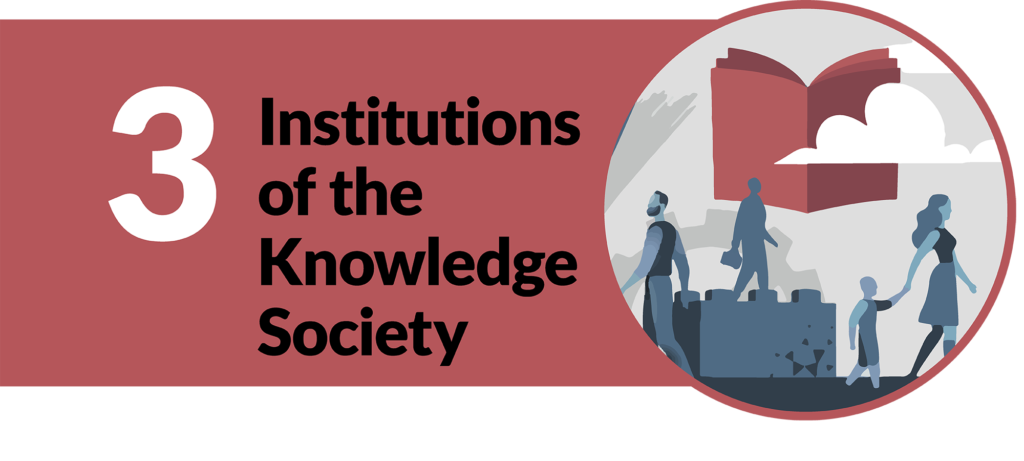
A third progression of the digital transformation involves the institutions of our knowledge society. Covid-19 intensified the digital reinvention of all organisations who generate, distribute, and preserve knowledge. In just a few weeks, media, schools, libraries, and universities adjusted their operations. Securing their transformation in the long term will require evaluation, research, and digital strategies. It would be a shame if the future was not shaped and supported by the findings of this involuntary experiment. Universities and colleges who multiply and generate knowledge are particularly in the spotlight in this respect.
The quality of their research will decide how smart we are in future in terms of how we handle biological, economic, and IT-related viruses. Smart means identifying risks at an early stage, preventing new pandemics, and eliminating their root causes, but also offering orientational knowledge – to break down anxiety and make the economy more robust. It’s up to us to determine how much this horrible virus damages our health, our society, and our economy.
Digital teaching at universities is here to stay.
During the COVID-19 emergency, technology and therefore digital literacy have been more crucial than ever before. The ability to find, evaluate, classify and create information on digital platforms are key competencies critical for all. Lifelong learning is the cornerstone to develop and enhance such future skills.
Luciana Vaccaro, Rector HES-SO University of Applied Sciences and Arts Western Switzerland
Students want to be able to work through lectures as podcasts at the time of their choosing. Due to the endless Covid loop, which has kept us isolated at home for weeks on end, we have been forced into new interactive teaching and learning formats. Will students do more private study, coached by their lecturers in video conferences and on walks? Chat bots connect students with data-based networking and encourage mutual learning. Also, collaborative reading, in which students see the markings and questions of their classmates, creates a new interaction. Covid-19 offers the chance to test e-learning environments in a critical fashion and reinforce collaboration between universities.
Students should be able to study for one term at any university in the country without today’s bureaucratic hurdles standing in their way. This proves even more true given that lifelong learning implies that we will, in future, study more than once and at more advanced ages.
The need to access knowledge online strengthens the paperless society. The opportunities here include interdisciplinarity through links and simple networking, immediacy, and a lively culture of expert debate through visible discourses. These benefits also come with some risks: echo chambers, overburdening, congestion, the manipulation of knowledge, and erasure of the past. Theoretical, reflective, and manual digital skills turn risks into opportunities. A paperless society places demands on libraries that have not yet fully digitalised their collections. Does each person really need their own login?
Administration also has some homework to do. The moment has finally come to build portals, similar to e-banking, for taxes, pensions, and official business. The latter should be possible in a single click: certifications, change of residence, residence confirmations and self-employment. An electronic ID is essential in this case. In Switzerland, the government in the role of the issuer enjoys greater trust than private companies do.
Institutions of the knowledge society include medical clinics, dentists, and veterinary practices, hospitals, residential, and care homes. There is no doubt that Switzerland lags behind in this respect. It’s placed near the bottom of the rankings in the Bertelsmann Foundation’s Digital Health Index. Covid-19 could strengthen innovations in telemedicine, psychology, physiotherapy, and dentistry.
We are experiencing the hour of digital medicine. Up until now, the risks rather than the benefits have been the focus, but the corona pandemic is changing this assessment. The acceptance of digital solutions has increased dramatically and will enable more efficient processes, data exchange and communication during the patient journey. The real benefit of this development will be a more personal interaction with our patients and reallocated time from administrative tasks to medical care.
Thomas Huffler, Managing Director Balgrist University Hospital Zurich
Only fully digitalised medical histories can fulfil the promise of personalised medicine and, alongside it, artificial intelligence. AI prescribes medication, recognises patterns in symptoms, analyses images taken by dermatologists, oncologists, and radiologists. Data are also essential for controlling epidemics. As data providers, not only our bodies and our smartphones, but also waste water and exercise frequency can be analysed. This digital future medicine in Switzerland will require more co-operation between hospitals, start-ups, and the digital economy.

Covid-19 is pushing for the removal of interfaces. Interfaces describe the tools we use to operate machines and surf the internet. Not much has changed ever since smartphones were first introduced. The eleventh iPhone has more or less the same features as the first. Will we be seeing intelligent glasses, rings, and contact lenses next?
Researching and introducing new interfaces could be a fourth progression of the transformation. This would affect phones, tablets, and computers – but also ticket and coffee vending machines, payment terminals, and scales in supermarkets. New interfaces are being driven forward due to the poor environmental footprint of screens. The virus has suddenly given us a view of a society in which we no longer want to touch things and where we shy away from screens, switches, buttons, and keys. In order to prevent smear infections, payment, and ordering systems, doors and vending machines are moving towards gesture control and voice computing. In the first instance, we will have to learn a new language; in the second, we must overcome our reluctance to talk to machines.
Our voice is a powerful information carrier. Like our fingerprint, it is unique. It also holds secrets about our health and personality. Our faces are equally rich in data. It is hardly surprising that wary citizens and consumers eye intelligent cameras and loudspeakers with critical caution. They fear surveillance, constant supervision, and manipulative data leeches. The fact that a digital world with new interfaces – without paper and without the old touch-control options – causes concern is manifested in the debate about a cashless society.
For our digital future, we should, therefore, regulate our data rights before the ubiquitous spread of new interfaces. One alternative to the hyper digital public space would be hygienic mummery with sterile gloves and face masks. In this future, we may leave fewer data behind, but we would pay for our freedom with enforced concealment and a new distance from our fellow humans.
New interfaces will change the way we access knowledge on the web. Basically, the PDF format, like paper, has reached its end-of-life stage. After all, isn’t this a pre-digital format that doesn’t touch upon the requirements of hypertext, scrolling, surfing, and search engines?
Form-filling with PDFs is particularly outdated. Conversely, web-based forms avoid media disruptions, increasing the quality of the data. Ideally, we would have better and more secure meta log-ins so that we would no longer have to enter our contact and key data anew on every website. The password has been searching for a successor for a long time now. If business transactions are to go digital, the digital signature will need to be established for reasons of legal security. Might this be an iris scan at some point, or a voice print?
These prospects show how important felt security is for citizens and customers, as well as access to digital expertise for those institutions of the knowledge society that are willing to transform. Their employer branding decides whether or not it will be able to recruit these specialists. It depends on creative possibilities, management styles, work spaces, and working conditions.
The interfaces of a networked society also include, in a wider sense, logistics. This describes the lines of connection between the analogue and digital worlds.
During the lockdown, the need for our services at Swiss Post was growing rapidly, going beyond the distribution of parcels and letters into the delivery of essential goods. Also the demand for our digital services and processes rose overnight – be it in combination with physical goods or as purely digital services. This required us to act quickly and to offer solutions that were implementable virtually within days to address the needs of our customers and employees.
Claudia Pletscher, Head of Development & Innovation, Post CH Ltd
Covid-19 opens a window of opportunity for rethinking environmentally friendly shipping methods. The virus gives us a sense of a future in which all age segments shop online even more frequently. We need to prepare ourselves for this scenario now and avoid future quota fixing by the government. One of the side effects of an increase in mail order is the resulting mountain of cardboard outside our front doors.
Preferably, we would see the use of biodegradable materials and a more sustainable recycling and returns system. In Scandinavia, Zalando is currently evaluating the returnable system known as Repack – with presently 40,000 reusable delivery bags in circulation. Here, too, digitalisation plays a role. AI-based fleet systems calculate the fastest routes.
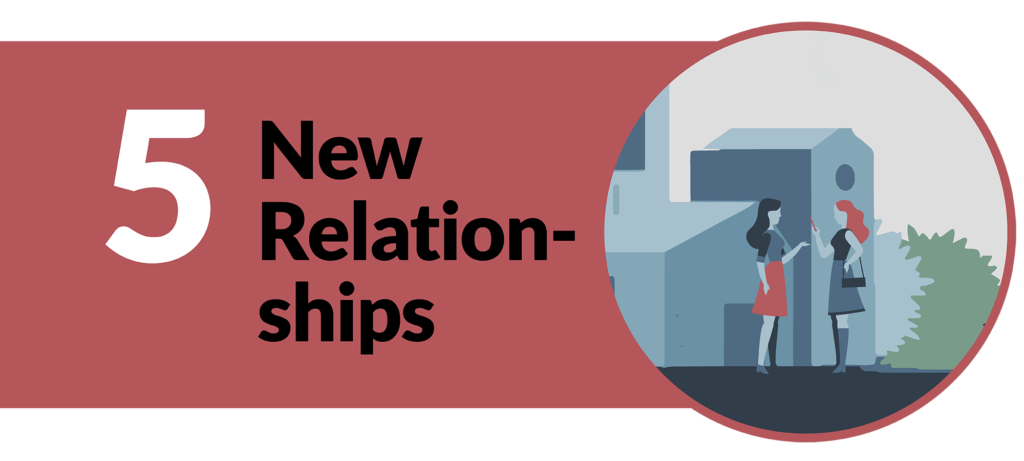
At the heart of the digital transformation, the next few months should see a focus on increasing the digital maturity of SMEs, administration, and those institutions of the knowledge society that have not yet become digitalised. Without a basic digital infrastructure, all other scenarios for digital Switzerland will remain nothing more than dreams. One thing that is fundamental for the next steps into the future is the basic digital work of the government. Official paperwork, from vaccination records to e-identity, should be issued by the government itself. Digital IDs should remain voluntary, or data protection must be guaranteed and controlled.
The more digital the functioning of the government and the more data it collects, the more urgent the question becomes of how controls can prevent the rise of a surveillance state and how its development can be supported through inspiring and networking sounding boards. Overall, Covid-19 creates an opportunity to rethink co-operation in business, society, politics and science. It is needed where companies are unable to solve social problems on their own.
Digital transformation requires a transversal and interdisciplinary approach as well as collaboration to break silos and be adaptable and economically sustainable. This paradigm shift can only be managed if academia, politics, administration, business, NGO’s and civil society join forces.
Eric Saracchi, Chief Digital and Information Officer at Firmenich
Promoting this cooperation for and through digitalisation is a fifth way to progress the digital transformation. For this purpose, companies with little or no digital experience need to obtain advice from experts. This will prevent the same errors from being repeated for years to come. Co-operations bring added value, not just with basic tasks but also with data management and visualisation, artificial intelligence, and gesture and voice-controlled interfaces. Working together enables cost-saving and sharing expertise.
When vets support other vets or custodians support other custodians, cooperation merges with competition. Those who enter into partnerships can also exploit untapped innovation potential. This potential detects who is able to co-use data, employees, and infrastructure. One core rule of innovation applies: it arises through combinations. The more surprising the choice of partner, the greater the potential for innovation. Such partnerships demand a degree of sharing – including customer access and profits. Solutions range from project exchanges to co-working and data partnerships.
Covid-19 has made us more aware of how important a modular understanding of infrastructure and workforce is in extreme situations. When you think in a modular way, cinemas soon become storehouses for hygiene articles, and taxis become delivery services for freshly picked asparagus. The vision of a modular economy could be a flexible skills market. Overnight, dentists will become hygiene specialists, and hairdressers will become fruit pickers.
A democratic society demands this agility not through force but through financial safeguarding. In order to strengthen the robustness of the economy, we need to rethink the concept of agility. A company is not agile just by introducing Scrum methodology, offering a home office day, or the CEO turning up in trainers. Instead, radical agility demands overnight action to establish new offers and customer relationships using the infrastructure, the raw materials, the skills, and the networks that are available in the ecosystem.
The corona pandemic is a socio-economic as well as a disruptive driver of digitalisation. We have yet to see the far-reaching structural impact it will have on the demand for mobility and on the way we are working. Already we can see: Companies that are only now starting with digitalisation and new ways of working like WorkSmart are at a disadvantage. At SBB we are well positioned. Up to 13’000 employees have worked from home at the same time. This requires solid digital infrastructures, data protection and cyber securtiy. We are happy to see our customers coming back gradually, it is a clear proof that personal relationships will remain essential in the future.
Monika Ribar, Chairwoman of the Board of Directors SBB
Ultimately, the time-out of the last few months has given us the chance to create even stronger links between the mega trends of digitalisation, demographic change, and green transformation. They will be connected through future markets and social innovations in the area of personalised health, the ecological design of hardware or smart agriculture featuring drones, and the Internet of Things.
Neither the future markets nor the desired social innovations can be realised without a high degree of digital maturity in terms of the processes, structures, and cultures of the players involved. Just as important are the relevant skills of employees. They will become all the more relevant the deeper the recession is triggered by the virus. You can interpret the pandemic as an opportunity for Europe. We might not be at the forefront of the platform economy, but now we could take up a leadership role in green digitalisation or the digitally supported green transformation.
In recent years, a certain fatigue regarding issues of digitalisation has been creeping across the country. That is not surprising. There was hardly a workshop, a conference, a title page, or a bestseller where the buzzwords of digital transformation were not repeated. At the same time, many people had no reason to get involved in digitalisation, let alone actively promote it.
Why should they bother to increase their surf speed, shop online, talk to the machines, be examined by a doctor in their own living rooms via webcam, offer lectures as podcasts, or think about futuristic post-smartphone interfaces? Were we lacking persuasive reasons to progress the digital transformation? Has the stress test shown that so far, it has failed to live up to its potential to connect Switzerland?
Covid-19 changes the starting position to the extent that in the last few weeks, we have all intensively experienced, explored, and trialled the digital world. It was the biggest experiment in the short history of the digital era. Strengthened by this experience, we have been given the chance to choose a new narrative for our future.
The Covid-19 crisis has clearly demonstrated the importance of digitalisation for business, public administration and society. It significantly increased the pressure to act decisively and quickly. It’s obvious that we have to strengthen out digital infrastructure, further digitalise business processes, invest in digital innovation and develop new digital business models, which accelerate our transition to a digital economy and society.
Ivo Furrer, President of digitalswitzerland
Should digital be an underworld that we retreat to in emergency situations? Does the digital world hold the roots of our economic, creative, and social evolution? Could we make better use of the web to identify damaging all sorts of viruses at an early stage and contain them using smart means? The last few weeks have made clear how little we know about our co-existence with plants, animals, and viruses. Does the internet not offer us the means to deepen, expand, and multiply our knowledge of the environment? Experts can easily share knowledge without institutional and disciplinary hurdles and publish their data. Plus, we can make direct contact with them.
Regardless of which narrative we choose, we need a Digital New Deal in order to make our infrastructure, institutions, and power of innovation future-proof. This new deal combines analogue with digital, digital professionals with digital beginners, natural sciences with the arts, the governments with its citizens, economy with society, nature with technology. The Digital New Deal must be part of the Green New Deal in order to avoid intensifying the dangers of climate change and a society of inequality.





 Chapter overview
Chapter overview 